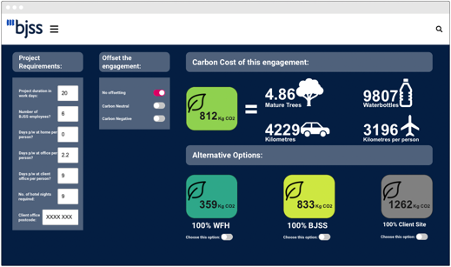Designing a Consulting Carbon Calculator
By Vrindha Venu, Jacob Hughes and Richard Seely, Associate Consultants at BJSS
Driven by recent events, including the UN COP26 climate conference, many pledges were introduced to reduce greenhouse gas emissions. An increase in consumer demand for sustainable brands has meant sustainability has been pushed up the agenda and is a key area socially, politically and economically for businesses. Google searches for ‘sustainable’ brands have more than tripled in the last five years alone.
From a business perspective, taking no action is costly. With sustainability moving from optional to a requirement, businesses need to adopt more sustainable solutions to remain competitive. BJSS, a carbon-neutral company (as of 2019), has pledged to become net zero by 2025 and is in the perfect position to deliver this.
Our challenge
As part of the BJSS Academy Incubator Challenge, we were asked to execute research on sustainability and produce a recommendation on how BJSS can continue to develop and improve in this space. We considered many options. But after evaluating the impact on BJSS, its clients, and the wider market, our proposal concluded with the Consulting Carbon Calculator.
What is a Carbon Calculator? A Carbon Calculator is a tool that can be used to understand the carbon cost of an individual, action, or organisation.
We propose creating a tool that can be used to understand the carbon cost of our engagement with a client. This enables businesses to understand better and potentially mitigate their carbon emissions.
The Consulting Carbon Calculator
The initial proof of concept for the carbon calculator focused on four different engagement scenarios:
- 100% work from home
- 100% work in the client office
- 100% work in the BJSS office
- A mix of the above.
The hybrid model (option 4) was created using real inputs from a recent client project, and a comparison was made between each case. Figure 1 shows a mock-up of the user front end of the carbon calculator and details the different scenarios for the client project.

Figure 1: A mock view of our Consulting Carbon Calculator which shows the carbon cost of different working scenarios
One of the key areas of discussion when designing the Calculator was the level of detail required. This exercise made us appreciate just how much every decision made has a carbon consequence - from your method of travel, to what food you eat. For this Calculator, a more high-level view was taken. Commuting distance and method were used both to the BJSS office and client office for each team member.
This also incorporated whether an individual needed hotel stays during the engagement. It was surprising to find just how large a carbon impact hotel accommodation generated. Other costs included domestic power and heating when working remotely, and an average office space carbon footprint. BJSS office space cost was found using the latest corporate governance report.
How does this help businesses to become more sustainable?
Understanding how routine business decisions impact the environment is essential to defining and achieving organisational sustainability objectives. Very little can be done with the figure a Carbon Calculator generates – it is how businesses act on that figure that generates the necessary and positive change.
To incorporate our Carbon Calculator’s functionality, BJSS is considering using the solution’s capability within our client pitches, thus demonstrating the carbon impact of different working methods, and encouraging more sustainable choices such as opting to work from home during an engagement.
In line with our ambitions to promote greater sustainability for our clients, our immediate goal for this technology centres around improving the Calculator's data. By using more accurate databases and permitting more flexibility for data input – for example, using multi-form travel – we hope to provide our clients with a precise understanding of the carbon cost of their engagement.
It is important to note that our Carbon Calculator is by no means a finalised and validated solution. Thus, it should be treated as a means of steering and generating discussion around how businesses can be more sustainable. We’d love to know what you think about the idea and how it can be used.